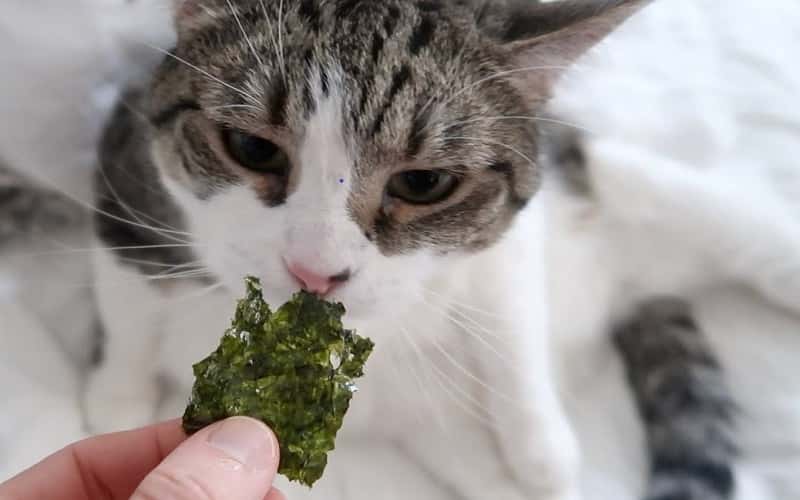Can Cats Consume Seaweed? Learn about the nutritional value of seaweed, the advantages and disadvantages of feeding it to cats, and how to avoid accidental consumption.
Nutritional information
Seaweed is a nutrient-rich plant that grows in salt water. It is typically low in calories and fat, making it an excellent addition to a healthy diet. Iodine, calcium, iron, magnesium, vitamin C, and other vitamins and minerals can all be found in seaweed. It also contains antioxidants and fiber.
Why is seaweed beneficial to cats?
In some ways, small amounts of seaweed can be beneficial to cats. Seaweed contains iodine, which can help keep a cat's thyroid healthy. Some cats may also benefit from the fibre in seaweed, which can aid digestion and prevent constipation.
Potential Risks of Feeding Seaweed
Even though seaweed has some benefits, it can also have negative consequences if cats consume it. One source of concern is that some types of seaweed contain a high concentration of iodine, which can be toxic to cats and cause thyroid problems. Furthermore, some types of seaweed may contain poisons or heavy metals that are harmful if consumed in large quantities.
Can Cats Consume Seaweed? How Safe Is Seaweed for Cats?
Most people believe that cats can consume small amounts of seaweed without becoming ill. However, it is critical to exercise caution and not overfeed them. Some seaweeds, such as bladderwrack and kelp, should be avoided because they contain a lot of iodine. Always consult a veterinarian before giving your cat seaweed or any other new food.
How simple it is for cats to consume seaweed
Cats eat mostly meat, and their digestive systems are designed to break down animal proteins. Cats can eat small amounts of seaweed without issue, but they may have difficulty digesting plant-based foods like seaweed and absorbing all of the nutrients they contain. Another reason why only a small amount of seaweed should be administered.
Signs that a cat has consumed an excessive amount of seaweed
If a cat consumes too much seaweed or a poisonous species, it may vomit, have diarrhoea, stomach pain, become tired, shake, or even have seizures. If you suspect your cat ate toxic seaweed or if it exhibits any of these symptoms, take it to the vet right away.
How to Prevent Cats from Accidentally Eating Seaweed
To keep your cat from accidentally eating seaweed, keep it out of his or her reach. Make sure your cat cannot access seaweed by storing it safely and exercising caution when preparing seaweed-based meals.
Can a Cat Eat Too Much Seaweed?
How much seaweed you can give a cat depends on a variety of factors, including its size, overall health, and tolerance. As a general rule, give your pet small amounts of seaweed as a treat only once in a while. Consult your veterinarian about the appropriate dosage and frequency.
How Much and How Frequently to Feed
Giving seaweed to cats should be done in moderation. It should not be a major part of their diet, but it can be given as a treat or supplement on occasion. It is critical to provide your cat with a well-balanced, varied diet that consists primarily of nutritionally complete cat food.
Why is a varied diet important?
Even though seaweed contains some nutrients, it is important to remember that cats must eat in a specific manner. Cats require food that is complete, balanced, and made specifically for them in order to meet their nutritional needs. A cat's diet can be made more interesting under the supervision of a veterinarian by introducing different flavors and textures of commercial cat food or by providing safe foods as treats on a regular basis.
Can cats consume seaweed?
To summarize, cats can eat a small amount of seaweed as a treat now and then, but it should not be a major part of their diet. Some seaweeds are high in iodine, and they may contain toxins or heavy metals. This means you should exercise caution. Before giving your cat a new food, always consult with a veterinarian to ensure that it is safe and appropriate for your cat.
Last Thoughts on Giving Seaweed to Cats
Even though seaweed has some benefits, it is not a necessary or important part of a cat's diet. A healthy cat's diet begins with providing them with food that is balanced and contains all of the nutrients they require. If you want to give your cat seaweed as a treat every now and then, start with small amounts and see how it reacts. Keep an eye out for any signs of stomach upset or other side effects, and discontinue use if necessary.
Why it's critical to consult with your veterinarian about your pet's diet
When considering changing or adding new foods to your cat's diet, consult with a veterinarian first. They can provide you with specific advice based on your cat's needs, health, and any risks associated with certain foods. Your vet will examine your cat's overall health and advise you on what to feed your cat to keep it happy and healthy.

